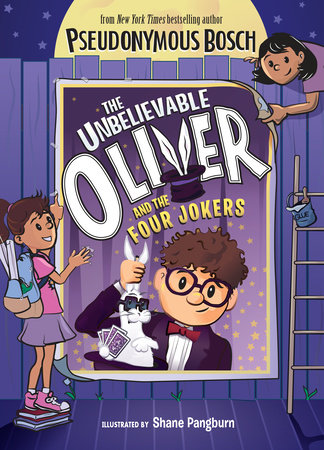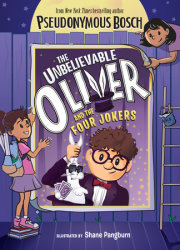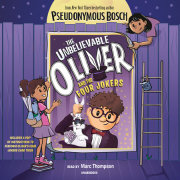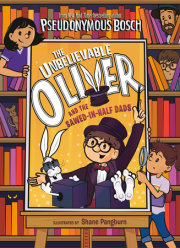1
Is This Your Card?
“Is this your card?”
“No.”
It was not their card.
The twins, Bea and Teenie, short for Beatriz and Martina, were not impressed. They were even less impressed when the magician pulled another wrong card from the deck. Then another still . . .
“Is this your card?”
“Not that one either.”
“Uh-uh.”
“Come on!”
“No.”
“Nope.”
“Nah.”
“No way!”
“That’s from GO FISH!”
“That’s a fish!”
*sigh*
Every card was wrong. Everything was wrong, really.
Oliver, our boy magician, was no wizard. He had no hat, no gloves, not even a wand. He was too small for his jacket, as well as for his age—eight last April. And he lacked the confidence you’d expect from anyone truly astonishing.
A magician should at least be astonishing. Wouldn’t you agree?
He made one last effort to startle and amaze.
“Okay, is this your card?” he said, holding up the four of diamonds again.
“Yes!” said Bea.
“Maybe,” said Teenie, who was having a little trouble paying attention. “See, we forgot our card. So it could be our card.”
Oliver covered his face with the few remaining cards in the deck.
“Don’t lie, Teenie!” Bea said with a glare.
“I’m not lying. I’m telling him the truth,” Teenie insisted. “We forgot his card. You were lying.”
“I lied to make him feel better. Don’t you feel better, Oliver?”
Oliver did not feel better, but it seemed unkind to say so. He tried to smile, unsuccessfully.
“Maybe you’re just not cut out to be a magician,” said Teenie helpfully.
Oliver had only recently started dabbling in the magical arts, after borrowing a deck of cards from his cousin Spencer, who worked at the local magic shop. Several cards were missing from the deck, but it had “all the main ones,” Spencer had assured him. “Anyway, you don’t need a full deck for most tricks. You’ll see, magic is easy.”
Oliver was beginning to think his cousin had misled him.
“Thank you for inviting me to your tea party,” said Oliver. “You said there was going to be cake. Where’s the cake?”
If there was one thing that was going to make Oliver feel better, it was cake.
“You’re welcome, Oliver,” Bea replied. “The cake is right in front of you—it’s imaginary. Like the tea. Do you want to play Genius Fairies?”
Oliver loved cake. All kinds of cake. Cupcake. Sponge cake. Pancake.
He even loved imaginary cake. Most days, it was the only sort of cake that his mother, who was a health food nut, would let him have.
He did not love Bea’s current favorite make-believe game, Genius Fairies: magical fairies who were good at math and science. Not Oliver’s strongest subjects.
Before he could refuse to play, Teenie chimed in: “Frida doesn’t want to play Genius Fairies. She wants to play Super Fairies.” Super Fairies were good at running, sneaking, and acrobatics. Also not Oliver’s strongest subjects.
“Her name’s not Frida.” Bea pointed to the cat. “It’s Calico.”
“Frida!”
“Calico!”
As the girls fought, Oliver checked the cat’s collar.
ACHOO!
In all the excitement, Oliver forgot that he was allergic to cats.
“Oliver, did you get an invitation to Maddox’s party?”
Oliver was relieved that they had changed the topic. But not so relieved when he realized what the new topic was.
Maddox, the richest kid at Nowonder Elementary, was turning nine that Saturday. His party was the talk of the third-grade class.
“Um . . . it must have gotten lost in the mail,” Oliver said. “It’s okay, I can’t go anyway.”
“You have to go—he has a pool!” Bea declared. “Besides, if we don’t go to the party, Maddox will think that we don’t like him.”
“But we don’t like him,” said Teenie.
“Yes, but we don’t want him to know that,” said Bea.
“Well, I’m not going if Oliver’s not going,” said Teenie.
“But I’m not even invited!” said Oliver.
“Wait. We don’t have a present,” said Bea. “If we don’t bring a present, then he’ll really know we don’t like him.”
“What can we get Maddox?” Teenie asked. “Wait. Does he have a cat?”
“I’m not giving him Frida!” said Bea.
“You call her Calico!”
“Well, I’m not giving him Calico either.”
“What then?”
Teenie and Bea looked at each other, then together they yelled at the top of their lungs: “Daddy! Papa! Emergency! We have to go to the pet store!”
Forgetting about Oliver, they ran upstairs to talk to their fathers.
Left alone at the table, Oliver turned to Frida/Calico. “Is this your card?”
Copyright © 2019 by Pseudonymous Bosch. All rights reserved. No part of this excerpt may be reproduced or reprinted without permission in writing from the publisher.







